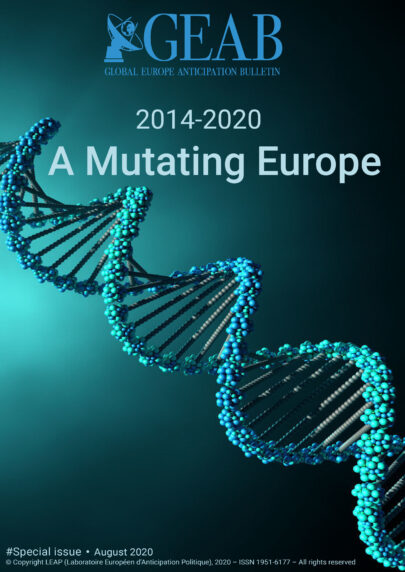GEAB Special file

The corona crisis has been the trigger for the EU to finally start issuing common bonds. It was a modest and hard-won step forward. In the midst of the flames, the fire brigade still took 5 days to decide to bring out the big fire hose. That says a lot about the degree of divisions and disagreements among the 27 states, and the imperative to reform the so-called ‘community’ method.
And it was in this context that our team chose the theme of European governance for its special August archives compilation edition. It marks the beginning of the European mutation phase as 2014. The Euro-Russian crisis that defined this year would considerably accelerate the complex and multi-factorial process of division, concurrent with the rise of nationalism that would notably lead to the exit of the United Kingdom.
The common thread running through our analyses of the EU’s transformation is its repolitisation, starting from what it sees as the only legitimate level, the national one. But the originality of our analysis is that we have affirmed from the beginning that the nationalist ‘populists’ would soon undergo two-pronged change: on the one hand, that their theses would be taken up by all the political parties and in particular by the traditional right; and on the other, their growing alliance at the European level, a level of power much more interesting than the national level.
Although the sovereignists currently appear to be more discreet, they nevertheless represent 17% of the European Parliament (not counting those who stricto sensu share their ideas within the EPP), and they are in the middle of a process of gentrification and Europeanisation, as shown by the Marechal-Sofo[1] partnership. Gone are the days of eccentric haircuts and off-putting outward signals.
A gigantic post-COVID economic crisis is going to hit Europe and it is not by chance that the centrist Macron has appointed a government made up of hardliners from Sarkozy’s old right-wing cabinet.[2] But we have not yet seen anything of what the European Parliament could produce in terms of trans-European political will[3]…
The fact is that the EU Council’s ‘historic’ negotiations are a drop in the ocean[4] in the face of the ferocity of the looming storm….
Rereading these few excerpts from the GEAB, as selected by our team for this special issue, helps to put the governance shocks that everyone is anticipating back into the right historical perspective.
__________________________
[1] Sources: Le Parisien, 18/05/2019 (for the Europeanisation); Valeurs actuelles, 25/07/2020 (for the gentrification)
[3] Source: European Parliament, 21/07/2020
[4] While Europeans are struggling to agree on a $750 billion loan to revive an economy of 500 million people, the Chinese are signing a $400 billion cheque to revive the oil industry in Iran alone. Source: LiveMint, 15/07/2020

The editorial GEAB team decided to share, exceptionally, with its readers an excerpt of the as yet unpublished document entitled "Community or Empire"; a book written by Franck Biancheri in [...]
A long time ago, in 1998, Franck Biancheri, our regretfully departed director of studies, signed an anticipatory article entitled: « 2009, when Europe ends up in the hands of the grandsons [...]
Since its creation, the Global Europe Anticipation Bulletin has been designed among other things to inform European public opinion and decision makers about the fact that the global geopolitical reconfiguration [...]
This anticipation is not very original but it must nevertheless be faced with all the lucidity required. It is hardly a hypothesis, but rather a certainty: the allied European far [...]
The financial crisis followed by the debt crisis has led to a substantial change in the mandate of the European Central Bank (ECB) and to more political provisions. The ECB [...]
There is a lot about epilogues in this issue! In the case of the EU (a phase in the construction of Europe which came into being on 7 February 1992 [...]
There’s no need to wait for the results of the election to anticipate some of the major features of the new Europe that will be established after June 2019. Certainly, [...]
The prospects for social reorganisation that can be imagined from the current health crisis are enormous. We have, therefore, decided to focus on Europe, about which we are much more [...]

Comments